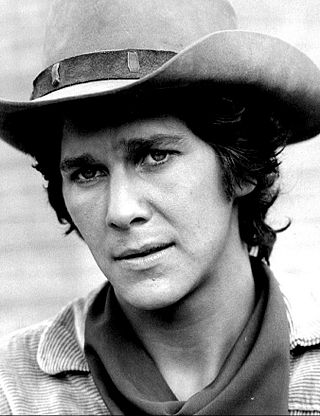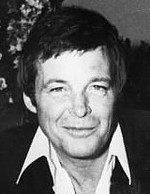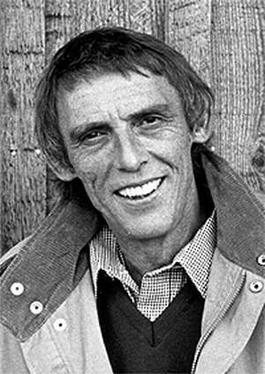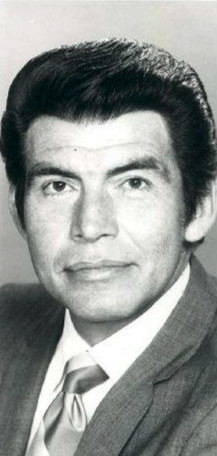Related Research Articles

Bonanza is an American Western television series that ran on NBC from September 12, 1959, to January 16, 1973. Lasting 14 seasons and 432 episodes, Bonanza is NBC's longest-running Western, the second-longest-running Western series on U.S. network television, and one of the longest-running, live-action American series. The show continues to air in syndication. The show is set in the 1860s and centers on the wealthy Cartwright family, who live in the vicinity of Virginia City, Nevada, bordering Lake Tahoe. The series initially starred Lorne Greene, Pernell Roberts, Dan Blocker and Michael Landon and later featured Guy Williams, David Canary, Mitch Vogel and Tim Matheson. The show is known for presenting pressing moral dilemmas.

Attack of the 50 Foot Woman is a 1958 independently made American science fiction horror film directed by Nathan H. Juran and starring Allison Hayes, William Hudson and Yvette Vickers. It was produced by Bernard Woolner. The screenplay was written by Mark Hanna, and the original music score was composed by Ronald Stein. The film was distributed in the United States by Allied Artists as a double feature with War of the Satellites.

John Saxon was an American actor who worked on more than 200 film and television projects during a span of 60 years. He was known for his work in Westerns and horror films, often playing police officers and detectives.

Tim Matheson is an American actor and director. Some of his best-known acting roles include the title character of the 1960s animated Jonny Quest TV series, Eric "Otter" Stratton in the 1978 comedy film National Lampoon's Animal House, and the recurring role of Vice President John Hoynes in the 2000s NBC drama The West Wing, which earned him two Primetime Emmy Award nominations for Outstanding Guest Actor in a Drama Series.

David Henry Chase is an American writer, producer, and director. He is best known for being the creator, head writer, and executive producer of the HBO drama The Sopranos, which aired for six seasons between 1999 and 2007. Chase has also produced and written for shows such as The Rockford Files, I'll Fly Away, and Northern Exposure. He created the original series Almost Grown which aired for 10 episodes in 1988 and 1989. He has won seven Emmy Awards. Chase's film debut came in 2012 with Not Fade Away, followed by The Many Saints of Newark (2021), a prequel film to the TV series The Sopranos.

The High Chaparral is an American Western action-adventure drama television series that aired on NBC from 1967 to 1971, starring Leif Erickson and Cameron Mitchell. The series was made by Xanadu Productions in association with NBC Productions, and was created by David Dortort, who had previously created Bonanza for the network. The theme song was written and conducted by Bonanza scorer David Rose, who also scored the two-hour pilot.

Michael Witney was an American film and television actor.

Denne Bart Petitclerc was an American journalist, war correspondent, author, television producer, and screenwriter.

Barrie Chase is an American actress and dancer.

Ned Romero was an American actor and opera singer who appeared in television and film.
George William Schenck was an American television writer and producer. His credits included Futureworld, the TV-movie The Phantom of Hollywood and numerous episodes of NCIS, where he was its showrunner from 2016 to 2018.

Eddie Little Sky, also known as Edward Little, was an American actor. A citizen of the Oglala Lakota tribe Eddie had parts in 36 feature films and over 60 television shows, mainly westerns in the role of a Native American. He was one of the first Native American actors to play Native American roles such as his performance in the 1970 film A Man Called Horse.

William Francis Claxton was an American film and television producer, editor and director. He made a number of films for Robert L. Lippert. He also directed and produced episodes of Bonanza, the NBC-TV series Little House on the Prairie, and also directed episodes of the NBC-TV series Father Murphy, The Rifleman, The Twilight Zone, Fame, and The High Chaparral.
Alex Sharp, also known and credited as Alex Sharpe was an American actor, stuntman, and writer, perhaps best known for his work in television western shows such as Bonanza and Gunsmoke.

The first season of the American Western television series Bonanza premiered on NBC on September 12, 1959, with the final episode airing April 30, 1960. The series was developed and produced by David Dortort, and season one starred Lorne Greene, Pernell Roberts, Dan Blocker, and Michael Landon. The season consisted of 32 episodes of the series's total 431 hour-long episodes, the entirety of which was produced in color. It aired on Saturdays from 7:30 pm–8:30 pm on NBC and placed at number 45 in the Nielsen ratings.

The second season of the American Western television series Bonanza premiered on NBC on September 10, 1960, with the final episode airing June 3, 1961. The series was developed and produced by David Dortort, and season two starred Lorne Greene, Pernell Roberts, Dan Blocker, and Michael Landon. The season consisted of 34 episodes of the series's total 431 hour-long episodes, the entirety of which was produced in color. It aired on Saturdays from 7:30 pm–8:30 pm on NBC and placed at number 17 in the Nielsen ratings.

The third season of the American Western television series Bonanza premiered on NBC on September 24, 1961, with the final episode airing May 20, 1962. The series was developed and produced by David Dortort, and season three starred Lorne Greene, Pernell Roberts, Dan Blocker, and Michael Landon. The season consisted of 34 episodes of a series total 431 hour-long episodes, the entirety of which was produced in color. At the start of the third season, the show was moved to Sundays at 9:00 p.m. In that time slot, the ratings soared and the series become second only to Wagon Train as the most popular program on American prime time television.

The fourth season of the American Western television series Bonanza premiered on NBC on September 23, 1962, with the final episode airing May 26, 1963. The series was developed and produced by David Dortort, and season four starred Lorne Greene, Pernell Roberts, Dan Blocker, and Michael Landon. The season consisted of 34 episodes of a series total 431 hour-long episodes, the entirety of which was produced in color. Season four was aired on Sundays at 9:00 p.m. It ranked #4 in the Nielsen ratings, the highest rated Western for the 1962–1963 season.

The sixth season of the American Western television series Bonanza premiered on NBC on September 20, 1964, with the final episode airing May 23, 1965. The series was developed and produced by David Dortort, and season six starred Lorne Greene, Pernell Roberts, Dan Blocker, and Michael Landon. The season consisted of 34 episodes of a series total 431 hour-long episodes, the entirety of which was produced in color. Season six was aired on Sundays at 9:00 p.m. It moved up to capture the #1 spot in the Nielsen ratings for the 1964-1965 season, a position it would hold for three straight seasons.
References
- ↑ A History of Television's The Virginian, 1962-1971, By Paul Green - Page 193 23: Writers, Frank Chase
- ↑ Glamour Girls of the Silver Screen - Barrie Chase Profile, November 64 Archived 2017-02-06 at the Wayback Machine
- ↑ A History of Television's The Virginian, 1962-1971, By Paul Green - Page 193 23: Writers, Frank Chase
- ↑ Turner Classic Movies - Frank Chase, COMPLETE FILMOGRAPHY Archived 2016-12-28 at the Wayback Machine
- ↑ Obituaries in the Performing Arts, 2004: Film, Television, Radio, Theatre, Dance, Music, Cartoons and Pop Culture, By Harris M. Lentz III - Page 72 Chase, Frank
- ↑ Western Movies: A Guide to 5,105 Feature Films, 2d ed., By Michael R. Pitts - Page 405 5025, The World in His Arms
- ↑ Turner Classic Movies - Saskatchewan(1954) Archived 2016-12-28 at the Wayback Machine
- ↑ Rotten Tomatoes - Walk the Proud Land (1956), Cast Archived 2016-12-28 at the Wayback Machine
- ↑ Fandango - Frank Chase Biography Archived 2016-12-29 at the Wayback Machine
- ↑ Keep Watching the Skies!: American Science Fiction Movies of the Fifties, By Bill Warren, Bill Thomas - Page 74 Attack of the 50 Foot Woman (1985)
- ↑ South China Morning Post, Sunday, 25 August 2013 - Rewind film: 'Attack of the 50 Foot Woman' - Doretta Lau Archived 2016-12-29 at the Wayback Machine
- ↑ Keep Watching the Skies!: American Science Fiction Movies of the Fifties, By Bill Warren, Bill Thomas - Page 74 Attack of the 50 Foot Woman (1985)
- ↑ Science Fiction Film Directors, 1895-1998, By Dennis Fischer - Page 335 Nathan Juran
- ↑ Getty Images - Bonanza - Season 4
- ↑ TV Buzer - The Virginian, S3 E23 - "Shadows of the Past" Archived 2016-12-28 at the Wayback Machine
- ↑ A History of Television's The Virginian, 1962-1971, By Paul Green - Page 242 SHADOWS OF THE PAST (3:23) # 24735
- ↑ A Reference Guide to Television's Bonanza: Episodes, Personnel and Broadcast History, By Bruce R. Leiby, Linda F. Leiby - Page 94 E186. The Ballerina (January 24, 1965
- ↑ A History of Television's The Virginian, 1962-1971, By Paul Green - Page 193 23: Writers, Frank Chase
- ↑ The High Chaparral - Guide to Writers and Directors, Writers Archived 2016-06-18 at the Wayback Machine
- ↑ World Filmography: 1967, By Peter Cowie, Derek Elley - Page 604 Sullivan's Empire